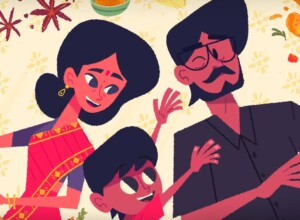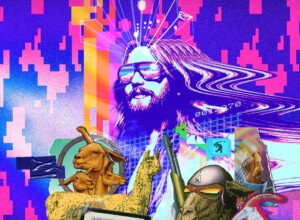Ryan Payton has led an illustrious career with roles in both games media and games production.
After leaving freelance journalism Ryan worked on the Metal Gear Solid franchise at Kojima Productions and Halo series with 343 industries.
Last year he left 343 to start his own studio, Camouflaj. His next project is République, an ambitious AAA game for iOS that is being part funded by a Kickstarter campaign. We caught up with Ryan to talk about the challenges of raising $500,000 and his vision for the game.
What is the premise for République?
A girl named Hope calls players and asks them to help her escape from a mysterious, totalitarian nation under the watchful eye of the Overseer. By hacking into this secret country’s surveillance system, players guide Hope through a mix of survival horror and stealth action and help her reach freedom. From a design perspective, games like Resident Evil, Metal Gear and Dark Souls have been heavy influences.
You have mentioned your aim to create a believable female lead, what can you tell us about the character of Hope?
We wanted to give players a believable character to partner with who isn’t overtly sexualized or a trained killer. In order to immerse players in the world of République, Hope had to look and act believable, and she needed to be relatable. This is why she doesn’t do flip kicks and shoot rocket launchers.
From your description it sounds like the player (and iOS device) is an active part of the fiction, is there an intention to blur the boundaries between the game and the player?
For those who have tried using Skype or FaceTime on an iOS device, they can attest that it being jarring at first – it’s a very personal experience. Your friend or loved one’s face is very close to yours.
It’s a different connection than sitting on your couch and doing a video chat through your Xbox, for example. This is something I realized last summer and started putting some serious thought around the idea of connecting players on an intimate level with a character through their iOS device.
Once I saw what Chair had accomplished with Infinity Blade, I felt like the tech was ready to power a believable 3D character for players to form a bond with. That is the origin of République.
The influences of 1984 and surveillance society are clear to see, will the story have something to say about technology and the world we live in?
Absolutely. Despite books like 1984, We, and Brave New World becoming integrated into our cultural vocabulary, I’m surprised there hasn’t been more movies and games that explore the topic of surveillance and privacy.
In fact, last spring I set out to change that when I began drafting a screenplay for a movie I called “Who.Is” about a security official who gets his identity stolen by hackers. I never took it beyond its first draft, but I have since integrated a lot of the ideas and themes from that story into the narrative of République. I often ask myself why I’m so fascinated by the topic, and I keep coming back to my own personal bouts of paranoia and seeing counter-arguments like Great Britain’s official “If you have nothing to hide, you have nothing to fear” advertising campaigns.
The development team has worked across a range of AAA games on traditional platforms, has the move to iOS presented any specific challenges?
iOS is a very straight forward platform and hasn’t presented any significant challenges for us. Patrick Ascolese, one of the engineers on the team, wisely chose Unity as our engine which makes it shockingly easy to push the game to iOS.
You believe traditional gamers will embrace the iOS platform if the right content is available. Has it been a struggle to convince investors that the market is there for a game like République?
Convincing people – whether they be corporate VPs, investors, producers or designers – has thankfully never been difficult. Everybody in the industry has been excited about the creative vision of the game. The challenge has been to convince the bean counters that there is a market out there for a story and action-heavy game on iOS. Without any other parallels on the market making millions of dollars, it’s hard for a lot of business people to pull open their pocketbooks for something new and different.
But I’m probably not telling you anything you don’t already know – just look at how many Call of Duty and Gears of War clones are out there now. Same logic.
Your funding model is a 50/50 mix of private investment and Kickstarter funding, what led you to this model?
Earlier this year we did a short tour to drum up initial funding. We quickly learned that securing financing for a million dollar game without sacrificing IP ownership and creative control is extremely difficult. We did, however, get promises from smaller investors who will meet us half way if we can Kickstart $500,000.
Although an iOS title, you have not forgotten the physical product, what can you tell us about the République journal?
The Journal is an attempt to restore that special feeling you get from buying physical products attached to the creative works you love. And through our Kickstarter research, we noticed a lot of excitement about physical goods like posters, T-shirts and collector’s editions, so we started putting some thought behind an item that would do more than sit on your shelf and collect dust. We wanted the item to be integrated in to the fiction. From there, the Journal was born.
You are trying to do quite a bit with this project, a deep and involved story, a reduced reliance on killing as a game mechanic, and raise half a million bucks on Kickstarter! What’s the biggest challenge?
Well, I think you covered most of our big challenges! I actually think the teams at Camouflaj and Logan have overcome our biggest challenge to date, which is taking a core idea and realizing an actual playable game. One of my old colleagues named David Berger once told me that starting a game is much harder than finishing one. I totally agree with him, which is why I feel like we’ve already overcome one of our greatest challenges.
Does the element of financial support from the public present you with any additional pressures in creating something unique and special?
This is partly why I’m so fascinated by Kickstarter: for games like Wasteland 2 and Double Fine’s adventure game, my guess is that, more so than the motivation to please a traditional publishing partner, the teams are extremely motivated to deliver a great game to the community who helped fund the game.
In your own words ‘you’ve bet the farm’, was it a risk worth taking?
No question in my mind. Life’s too short to not do something different, unique and risky.
You can support République on Kickstarter until 11th May 2012
Images courtesy of Camouflaj.






